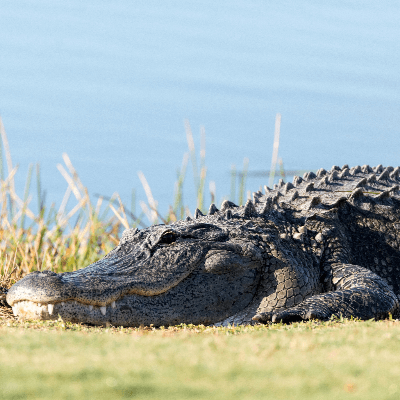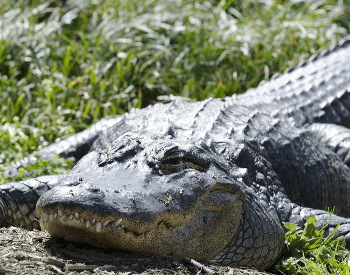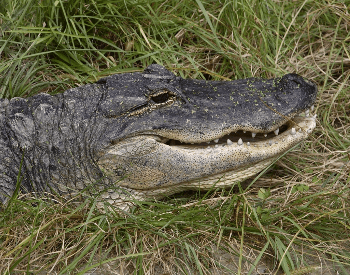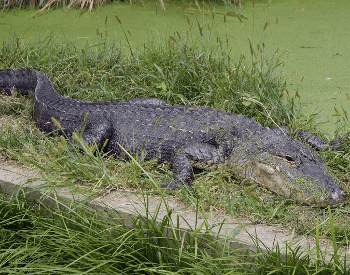
- Name: Alligator
- Type Species: Alligator mississippiensis
- Lifespan: Up to 80 years
- Diet: Meat (carnivorous)
- Range: Southeastern United States
- Length: 11 feet on average (male)
- Weight: 790 pounds on average (male)
16 Alligator Facts for Kids
- Alligators are large reptiles that are members of the Alligatoridae family.
- Their scientific type species name is alligator mississippiensis.
- There are two living species of alligators, one is A. mississippiensis and the other is A. sinensis.
- Male alligators can reach an average length of 11 feet.
- Male alligators can reach an average weight of 790 pounds.
- Female alligators can reach an average length of 8 feet.
- Female alligators can reach an average weight of 575 pounds.
- There is no definitive lifespan for alligators, 50 years is common in the wild and the oldest living alligator in captivity is over 80 years old.
- It’s estimated over 5 million alligators are living in the southeastern United States, with more than 20% of the total population living in the U.S. State of Florida.
- Alligators are apex predators. If they reach adulthood size there isn’t anything that can hunt them, except other alligator’s and humans.
- Only one in five alligator hatchings will make it to adulthood.
- Alligators are carnivores and will eat invertebrates, aquatic animals, other reptiles, birds and all sizes of mammals.
- It’s common to find alligators in lakes, slow-moving rivers, ponds and swamps.
- Alligators constantly replace their teeth. They’ll have 70 to 80 teeth in their jaw at any given time and go through 2,000+ teeth in an entire lifetime.
- The sex of an alligator is determined by the temperature at which the eggs develop. Temperatures over 93 degrees Fahrenheit produce males, temperatures at or under 86 degrees Fahrenheit produce females. Anything in-between can product both males and females.
- The name “alligator” means “the lizard” and comes from the Spanish word “el lagarto”.
Alligator Pictures

A nice close-up photo of the American alligator.Credit: Smithsonian’s National Zoo

A photo of the head of an American alligator.Credit: Smithsonian’s National Zoo

A full length photo of the American alligator.Credit: Smithsonian’s National Zoo
Additional Resources on Alligators
- American alligator – Smithsonian’s National Zoo – Learn more about the American Alligator (Alligator mississippiensis) on the Smithsonian’s National Zoo & Conservation Biology Institute Website.
- American Alligator – Wikipedia – Discover more facts about the Alligator mississippiensis on the Wikipedia website.
- American Alligator – National Geographic – Explore more about the American Alligator on the National Geographic website.
